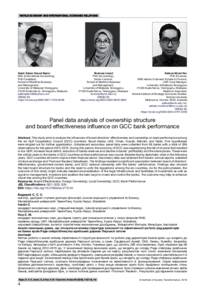Document
Panel data analysis of ownership structure and board effectiveness influence on GCC bank performance.
Identifier
DOI: 10.21003/ea.V172-01
Source
Economic Annals-XXI. v. 172, 7-8, p. 4-8
Contributors
Ismail, Shahnaz., Author
Nor, Safwan Mohd., Author
Country
Uganda.
Publisher
Institute of Society Transformation.
Gregorian
2018-10-31
Language
English
Subject
English abstract
This study aims to analyze the influences of board directors' effectiveness and ownership on bank performance among the six Gulf Cooperation Council (GCC) countries: Saudi Arabia, UAE, Oman, Kuwait, Bahrain, and Qatar. Five hypotheses were singled-out for further approbation. Unbalanced secondary panel data were collected from 68 banks with a total of 268 observations for the period 2012-2015. During this period, the economy of GCC was experiencing the fall of oil price that resulted in low GDP, increase fiscal deficit, reduction of banks reserves and decline in banks' profitability and the share prices. These were the critical years to the banks in GCC countries as their performance was crucial. Besides facing diplomatic crisis in the following years, GCC countries strived to improve their financial sector. Secondary data was obtained from banks' annual reports, websites of stock exchange and Thomson Reuters Datastream. The findings revealed a significant association between board of directors' effectiveness, government-owned banks, and GCC national ownership with the banks' performance. Findings also showed the best board structure for banks and the need to unify the regulations among the six countries. As for the policymakers, the outcome of this study might indicate needed reconsideration of the legal infrastructure and facilitates of investment as well as signal to management, investors and auditors the best ways to invest and control the banks. The outcome may help to enhance closer ties among the GCC countries.
ISSN
1728-6220
Resource URL
Category
Journal articles

